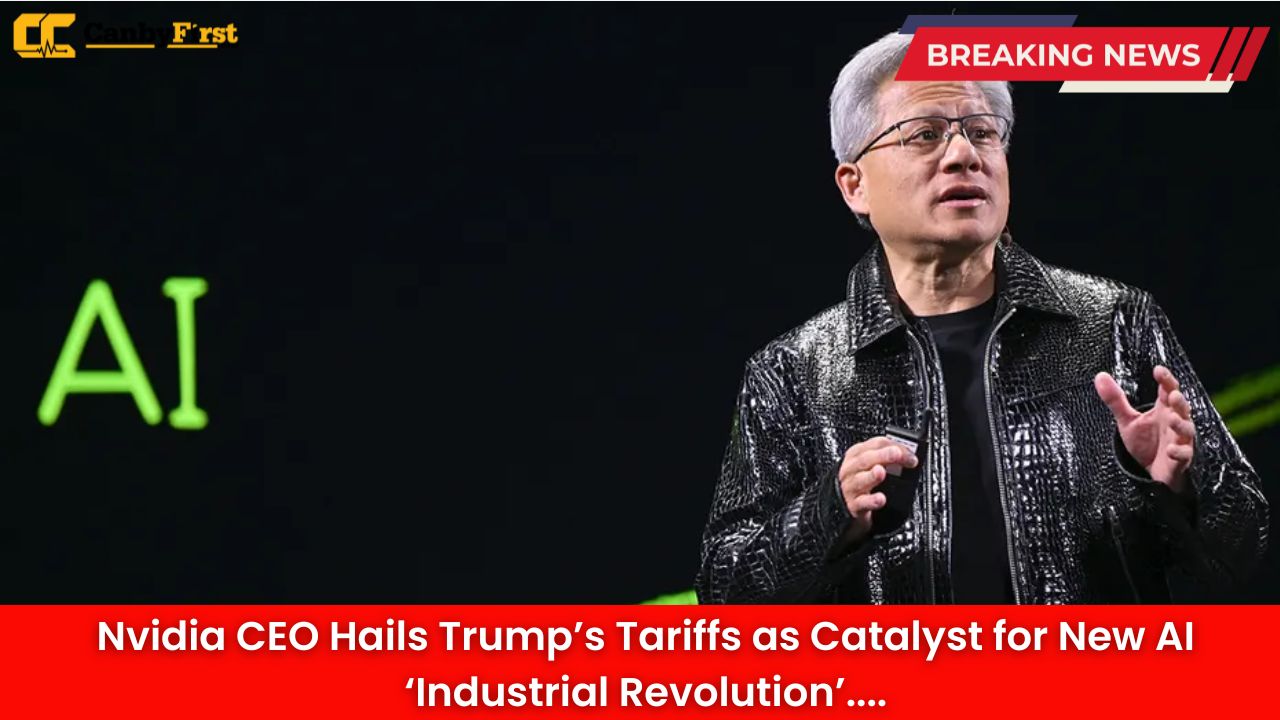Silicon Valley, US:
Nvidia’s charismatic CEO Jensen Huang declared that the world is entering a new “industrial revolution powered by artificial intelligence” and credited President Donald Trump’s tariff policies for accelerating domestic semiconductor production. Speaking at a recent industry conference in Silicon Valley, Huang said the push for self-reliance in chipmaking has created a foundation for what he termed “the era of intelligent industry.”
Huang’s comments come as Nvidia cements its position as the most valuable semiconductor company in the world, with its advanced AI-powered chips fueling everything from self-driving cars and data centers to robotics and creative tools. He noted that the latest wave of tariffs on foreign chip imports has encouraged both public and private sectors to build new fabrication plants across the United States.
Also Read
“The New Industrial Revolution”
During his keynote, Huang described AI as “the new engine of global productivity,” comparing its influence to that of electricity and the internet. He argued that the next decade would define which countries emerge as leaders in the intelligent industrial economy — an economy powered by autonomous manufacturing, smart robotics, and edge computing.
“This isn’t just about faster computers,” Huang told a packed audience. “It’s about machines that can see, reason, and act — transforming how everything from logistics to healthcare operates. We are literally witnessing a new industrial revolution unfold before our eyes.”
Huang emphasized that advances in generative AI, accelerated computing, and neural network training are already reshaping industries from automotive design to pharmaceuticals. The growth of AI-powered simulations, optimized by Nvidia’s graphics processors, has dramatically shortened innovation cycles and reduced costs for companies worldwide.
Praise for Trump’s Tariff Strategy
In a rare political endorsement from the tech sector, Huang applauded President Trump’s approach to tariffs, saying they have “sparked a real awakening in America’s industrial policy.” The tariffs, initially criticized by some analysts and business groups, aimed to reduce dependency on overseas chip manufacturing — particularly in Asia.
According to Huang, those measures have spurred innovation and investment in domestic fabrication facilities, drawing billions in funding toward advanced chip production. Several large-scale plants in Arizona, Texas, and New York have either been completed or are under construction, making the US a more significant player in global chip supply.
“The tariffs forced a reckoning,” Huang explained. “They made policymakers and businesses realize how fragile our supply chains had become. Now we’re seeing a resurgence in American chipmaking — a renaissance of industrial strength.”
Nvidia’s Expansion and the AI Boom
Nvidia itself continues to lead the global AI boom, with its data center business surpassing expectations for the fifth consecutive quarter. The company’s chips are central to powering advanced machine learning systems run by cloud giants and research institutions.
Huang highlighted Nvidia’s ongoing projects to integrate AI computing into sectors such as manufacturing and energy. The company recently unveiled its new AI-driven “Factory of the Future” initiative, which combines robotics, high-performance computing, and real-time AI analysis to create fully automated production lines.
“Our goal is to build factories that design and improve themselves — systems that adapt as they learn,” said Huang. “This will redefine efficiency and productivity for generations to come.”
The Competitive Landscape
Despite massive growth, the semiconductor industry faces fierce competition and geopolitical complexities. US-China relations remain tense, particularly regarding access to advanced chipmaking technology. Huang avoided direct comments on export restrictions but suggested that fostering domestic capabilities was now a national necessity rather than an option.
“The world is fragmenting into multiple supply ecosystems,” he noted. “In this environment, self-sufficiency isn’t about isolation — it’s about resilience. The countries that can design, produce, and scale advanced AI technology locally will shape the future.”
Huang’s remarks align with the broader industry trend of reshoring and diversification. Major players like Intel, TSMC, and Samsung have announced or expanded US-based facilities in response to government incentives and geopolitical pressures. Nvidia, primarily a chip designer, relies on these manufacturing partners to produce its cutting-edge processors but has invested heavily in software, AI frameworks, and ecosystem partnerships.
Economic and Political Reactions
Huang’s comments drew mixed reactions across political and economic circles. Supporters of the Trump administration’s trade policies praised the Nvidia CEO’s acknowledgment, saying it validated the effectiveness of tariff-driven industrial strategy.
Proponents argue that the tariffs, combined with the bipartisan CHIPS and Science Act, have successfully reignited US manufacturing and reduced dependence on foreign suppliers. Critics, however, contend that tariffs contribute to inflationary pressures and disrupt global trade efficiency.
Still, industry analysts note that the continued construction of semiconductor facilities indicates longer-term confidence in the US as a viable hub for chip manufacturing.
The Future of AI-Driven Industry
Looking ahead, Huang predicted that the combination of AI and manufacturing would redefine not only how goods are produced but also how economies measure growth. He described a future of “intelligent factories” operating 24/7, run by AI agents capable of predicting maintenance, adjusting designs on the fly, and managing resource allocation without human oversight.
“The next wave of global prosperity,” Huang said, “will come from countries that embrace AI to make their industries smarter, not just faster.”
He called for continued collaboration between public and private sectors to ensure that the U.S. remains competitive, warning that innovation must be matched by infrastructure and skilled workforce development.
FAQ
Q: What did Nvidia’s CEO say about Trump’s tariffs?
A: Jensen Huang said the tariffs were instrumental in awakening the U.S. to restore domestic semiconductor manufacturing and strengthen industrial resilience.
Q: How does Nvidia benefit from the new AI industrial revolution?
A: Nvidia’s GPUs are central to AI computing, enabling breakthroughs in robotics, manufacturing, and data science — the core engines of the so-called industrial revolution.
Q: Are US chipmaking firms expanding production domestically?
A: Yes, major firms such as Intel, TSMC, and Texas Instruments are expanding US-based facilities, spurred by tariffs and federal incentives.
Q: What industries are being transformed by AI according to Huang?
A: Manufacturing, healthcare, logistics, automotive design, and energy are leading sectors experiencing transformation through AI and accelerated computing technologies.












